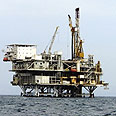
Gas to replace oil as Yemen’s moneybag
First shipment of Liquefied Natural Gas from Yemen to South Korea will set sail in August; 'oil production is falling, so the only compensation is gas production,' GM says
Liquefied Natural Gas (LNG) will soon overtake oil as the primary source of foreign capital in Yemen.
The first shipment of LNG from Yemen to South Korea will set sail in August, initiating a much-needed new supply of income for the Yemeni government.
“This in an important project for Yemen because the majority of the income comes from the oil industry today, approximately 70 percent, and oil production is falling, so the only compensation is gas production,” Joel Fort, General Manager of LNG Yemen, told The Media Line.
LNG Yemen is the company behind the export program. Its principal owner is the French oil and gas giant Total, which holds 39%, followed by the independent American oil company Hunt Oil, which controls 17%.
Three South Korean companies and local Yemeni investors make up the remainder of the backers.
“This project has the potential to bring $30-50 billion yearly to the government,” Fort said.
Low oil prices resulted in a 75 percent drop in crude oil profits for oil companies working in Yemen in the first quarter of 2009, according to a report released by The Central Bank of Yemen on 7 June.
Yemen’s 2009 first quarter profits were $365.1 million, compared to $1.46 billion in the first quarter of 2008.
Yemen exports about 200,000 barrels of oil a day—a drop in the ocean compared to the 10 million barrels exported daily by the world’s number one producer, Saudi Arabia.
One of the main advantages of liquefying the gas instead of exporting it via pipelines is that it becomes possible to transport the gas long distances by ship. Transportation from Yemen to South Korea by pipeline would be impossible.
However, Yemen remains politically unstable. A low-intensity rebellion by members of the Al-Huthi tribe in northwestern Yemen, as well as increasing Al-Qaeda activity, has turned the countryside into lawless territory. Kidnapping and attacks on foreign nationals happen on regular basis. The foreigners are usually used as bargaining chips to negotiate the kidnappers’ demands, which include releasing clan members from jail or improving living conditions.
But LNG has taken the situation into consideration. “We have not been subject to attacks or sabotage but we have very strict provisions to protect the sites, to protect the people, to protect the transfer of gas,” Ford said.
Among the preventative measures taken by the company is to use private jets to fly its foreign personnel, which constitutes 30% of the workforce, in and out of the country.
Reprinted by permission of The Media Line










